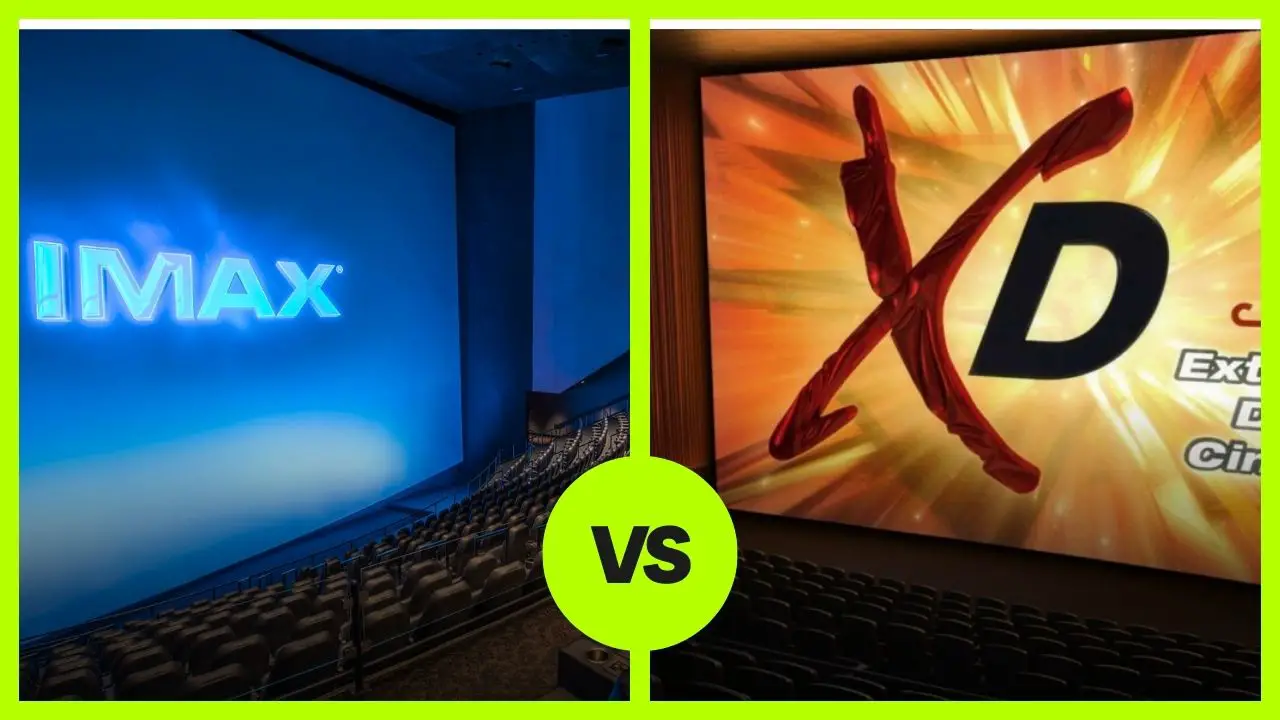In the ever-evolving world of cinematic experiences, two giants stand tall: IMAX and Cinemark XD. Both promise unparalleled movie-watching experiences, but which truly delivers the best of the best? Let’s dive deep into the world of large format screens and find out.
The Tale of Two Titans: IMAX vs. Cinemark XD
IMAX: Born in 1967, IMAX has been a revolutionary force in the cinema world. With its massive screens, some towering over five stories tall, it offers an almost surreal viewing experience. However, not all IMAX screens are created equal. The term “LieMAX” has been coined for screens that advertise themselves as IMAX but fall short of the company’s quality standards in projection, sound, and screen size.
Cinemark XD: A more recent entrant, Cinemark XD made its debut in 2009. Exclusive to the Cinemark movie chain, XD screens are known for their wall-to-wall width, often giving the illusion of a larger screen than IMAX. But does size alone determine the quality of the experience?
Cinemark XD vs IMAX – Quick Comparison
| Feature/Aspect | IMAX | Cinemark XD |
|---|---|---|
| Date | 1967 | 2009 |
| Developed By | The IMAX Corporation | Cinemark Theatres |
| Screen Size | Approx. 72 feet tall and 50 feet wide | Approx. 70 feet tall and 133 feet wide |
| Aspect Ratio | 1.43:1 or 1.90:1 recommended | 2.20:1 or 1.85:1 recommended |
| Number of Screens in U.S. | 362 screens | 168 screens |
| Global Territories Served | 80 countries across the Americas, Europe, Africa, Asia, and Australia | 35% more expensive than the standard format |
| Average Ticket Price | 35% more expensive than the standard format | 35% more expensive than standard format |
| Supported Chains | AMC, Marcus, Regal, B&B, Cinemark, and more | Exclusive to Cinemark |
| Sound System | DTS:X audio technology (object-based 3D sound quality) | 11.1 multi-channel surround systems |
| Ticket Price Consideration | Might be more expensive at chains like Regal or AMC | Generally more affordable due to Cinemark’s pricing |
| Screen Availability | More widespread with nearly double the number of screens in the U.S. | Less widespread in comparison to IMAX |
| Pros | – Larger than normal screen – Films shot with special IMAX cameras – Available in 2D and 3D with digital projection – More IMAX screens than Cinemark XD screens | – Screen appears larger than IMAX – Ticket price is not much more expensive – Many more films play in XD than IMAX – No need for special certifications or filming |
| Cons | – IMAX films cost more – Movies don’t show in IMAX for long – Some IMAX screens are fake “LieMAX” screens – IMAX 3D is not the most popular 3D format | – Less XD screens than IMAX screens – Surround sound is not as impressive as IMAX’s – Screens are shorter than IMAX’s – Not as iconic a brand name as IMAX |
Visual Experience
- IMAX: Known for its towering height, IMAX offers a unique aspect ratio of either 1.43:1 or 1.90:1. This means movies can be displayed in a format that fills more of the screen, providing an immersive experience. However, close-ups can sometimes feel overwhelming due to the screen’s sheer size.
- Cinemark XD: While it might not reach the towering heights of IMAX, Cinemark XD compensates with its impressive width. The screens stretch from wall to wall, and while they might not always be taller than IMAX, they often appear larger due to their increased width.
Audio Experience
- IMAX: With its DTS:X audio technology, IMAX offers an object-based 3D sound quality. This means that the sound moves around the viewer in a three-dimensional space, providing an enveloping audio experience.
- Cinemark XD: While it boasts an 11.1 multi-channel surround system, which is undoubtedly impressive, it doesn’t quite match the 3D sound quality of IMAX. However, for many, the difference might be negligible.
Seating and Comfort
- IMAX: The seating varies depending on the theater, but in larger IMAX venues, the seats are more upright and might not offer the same reclining comfort as other formats.
- Cinemark XD: Known for its plush seating, Cinemark XD theaters often offer spacious reclining seats that can enhance the movie-watching experience.
Ticket Price and Availability
Both IMAX and Cinemark XD tickets tend to be around 35% more expensive than standard formats. However, Cinemark, being one of the more affordable chains, often has a slight edge in pricing. In terms of availability, IMAX, with over 360 screens in the U.S., has a broader reach compared to Cinemark XD’s 168 screens.
Health Considerations in IMAX and Cinemark XD Theatres
While the immersive experience offered by IMAX and Cinemark XD is undoubtedly a treat for the senses, it’s essential to be aware of potential health concerns for some viewers. Here’s what you need to know:
- Motion Sickness: Due to the large screens and immersive visual effects, some viewers may experience motion sickness. This sensation can feel like dizziness or nausea and is caused by a disconnect between what the eyes perceive and what the body feels.
- Visual Strain: The sheer size of the screen can sometimes lead to visual strain, especially if seated too close. Continuous focusing on fast-moving images can tire out the eyes, leading to temporary discomfort.
- Headaches: Some viewers report headaches after watching movies in large format theaters. This can be due to a combination of visual strain, loud sound effects, and the brain’s processing of immersive visuals.
- Sensitivity to Loud Sounds: IMAX and Cinemark XD pride themselves on their state-of-the-art sound systems. However, the high volume and surround sound can be overwhelming for some, potentially leading to temporary hearing discomfort.
Tips to Minimize Discomfort:
- Seating Position: Avoid sitting too close to the screen. Choosing a seat towards the middle or back of the theater can provide a more comfortable viewing angle and reduce visual strain.
- Take Breaks: If you’re prone to motion sickness or visual discomfort, consider taking short breaks during the movie to reset.
- Protect Your Ears: If you’re sensitive to loud noises, consider using earplugs to dampen the volume slightly without compromising the audio clarity.
- Stay Hydrated: Drink water before and after the movie. Dehydration can sometimes exacerbate symptoms of headaches.
- Know Your Limits: If you’ve had issues in the past, consider watching movies in standard formats or choose theaters known for a more moderate audio-visual experience.
By being aware and taking simple precautions, you can ensure a comfortable and enjoyable cinematic experience.
User Opinions about IMAX and Cinemark XD
The debate between IMAX and Cinemark XD has been ongoing for years, and users from various threads have shared their insights. Here’s a compilation of their perspectives on the two formats:
1. Screen Size and Quality
- One user mentioned that IMAX is superior, but XD is perfectly fine. IMAX has a standard, but it has become inconsistent over the years. Not all IMAX screens are created equal.
- Another user pointed out that Cinemark XD used to advertise a “wall to wall & floor to ceiling screen,” which was great. However, the screen ratio is 16:9, and most films are shot in 1.85:1 or 2.39:1 size ratios, leading to some thick letterboxing.
- A different user highlighted that IMAX will have an expanded aspect ratio. If a movie is formatted for IMAX, the IMAX version will fill up the screen.
2. Location and Convenience
- A user prefers XD because it’s closer to their location and usually opts for IMAX when out of town.
- Another individual mentioned not being sure about IMAX but finding XD great, reserving the extra XD fee for a few blockbusters.
3. Seating and Comfort
- A discussion arose about whether the recliners are in the IMAX auditorium, with the conclusion being that IMAX gets to choose the seats for the auditorium, implying they might not always be as comfortable as XD’s recliners.
- Another user mentioned that while the picture in XD was dim for “Top Gun,” the seating at local IMAX theaters was pretty comfortable.
4. Sound and Audio Experience
- One user mentioned that a particular theater’s new XD has a massively upgraded sound system that surpasses IMAX.
- Another individual sometimes prefers XD to IMAX, noting that the XD screen at their workplace has Dolby Atmos, which offers a superior sound experience.
5. Movie Filming and Presentation
- A recommendation was made to see “Top Gun: Maverick” in IMAX, especially since it was filmed for IMAX.
- Another user stated that for movies “Filmed for IMAX,” they’d choose IMAX. For movies just optimized for IMAX, they’d rather go to an XD.
6. Overall Experience and Preference
- A question was raised about whether the XD version is better than the IMAX version, with the response being that Cinemark XD is the best movie-going experience.
- Another user believes XD is a fair alternative if you only have a Xenon IMAX nearby.
7. Recommendations and Tips
- One user advised checking a movie’s technical specifications to see if the movie was actually shot with IMAX cameras. If not, it might not be worth seeing in IMAX.
- Another suggestion was to ignore the IMAX brand and instead look at the size of the screen, the projection method, and the recording system.
In conclusion, the preference between IMAX and Cinemark XD seems to be subjective and varies based on individual experiences, the specific movie being watched, and the particular theater’s quality and amenities.
Conclusion
Choosing between IMAX and Cinemark XD often boils down to personal preference and the specific theater’s quality. While IMAX has a storied history and offers a globally recognized experience, Cinemark XD has made significant strides in a short time, challenging the status quo. Both formats offer unique experiences, and the best way to choose might just be to experience both and decide for yourself. check out our articles on whether IMAX is worth it, IMAX vs. Standard, IMAX vs. 4DX, and the best seats for IMAX.

I’m Shaun Conroy, an audiophile & founder of HiFi Audios. Holding a Bachelor’s in Sound Engineering, I bring deep expertise in audio devices and offer insights & recommendations to fellow enthusiasts.





